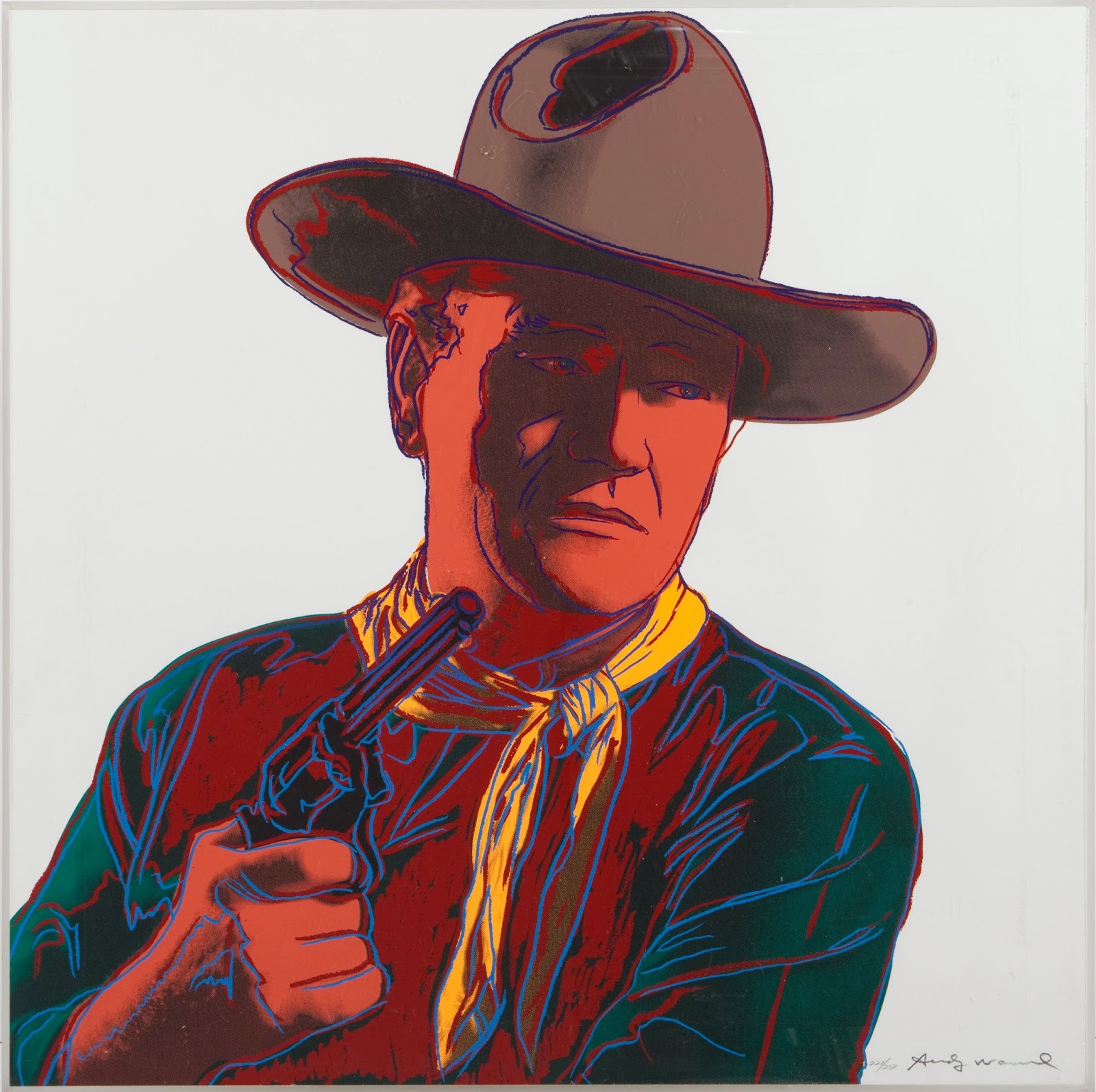In 1986, the year before his death, Andy Warhol continued his appropriation of classic American icons and images with his "Cowboys and Indians" series, a portfolio of ten graphic screenprints representing traditional figures and figureheads of the American West. Here, Warhol intersperses recognizable portraits of well-known American "heroes"-- Teddy Roosevelt, Annie Oakley, General George Custer, and John Wayne, --with less familiar Native American images and motifs in his ironic commentary on Americans' collective mythologizing of the historic West. These works possess many of Warhol's stylistic hallmarks, such as his characteristic linear reiteration and his use of famous images resonant in the collective American consciousness.
John Wayne was born Marion Robert Morrison in Winterset, Iowa, in 1907.
When he was a boy, his family moved West settling in Lancaster, California and later Glendale, California where he would come to be known as Duke. Marion’s dog, an Airedale, was named Duke, and soon the local Glendale firefighters started calling Marion Duke, too. Duke’s academic and athletic success at Glendale High led to a football scholarship at the University of Southern California (USC).
A body surfing accident at Newport Beach cut short his promising athletic career, so the former tackle looked to studio work to help pay his tuition. In a film called The Big Trail, Marion Morrison became John Wayne, and the movie business – and the country – would never be the same.
John Wayne’s monumental film career spanned five decades. He appeared in more than 175 films, more than a dozen directed by John Ford alone. For an entire generation, he was Hollywood’s biggest and most durable box-office star. Incredibly versatile, Wayne starred in just about every genre Hollywood offered: war movies, romantic comedies, police dramas, histories. But it was the Western – the American cinema – where Wayne made his most lasting mark. He was nominated three times for the Academy Award, winning the Oscar for Best Actor in 1969 for True Grit. And his powerful performance in The Searchers has been singled out by filmmakers and actors alike as the greatest performance by an actor on film, ever.
In 1964, John Wayne was diagnosed with lung cancer and beat it, after a lung and several ribs were removed. Fifteen years later he was again diagnosed with cancer — this time of the stomach – succumbing to the disease at age 72. Posthumously, Wayne was awarded the Congressional Gold Medal. A year later, in 1980, President Jimmy Carter awarded him the Presidential Medal of Freedom, America’s highest civilian honor. Wayne is among only a handful of individuals who have received both the Presidential Medal of Freedom and the Congressional Gold Medal.
To this day, Wayne appears in the Harris Poll’s annual listings of America’s favorite movie stars, ranking third in the most recent Poll. He has never been out of the top ten since the Poll’s inception.
In his honor, the John Wayne Cancer Foundation (JWCF) , founded in 1985 by Wayne’s children, is an organization that brings courage, strength and grit to the fight against cancer. Since its founding, JWCF has supported awareness programs, education programs and support groups, and has also been committed to groundbreaking cancer research and education at the John Wayne Cancer Institute. The JWCF recently launched Team Duke, a fundraising effort for athletes of any level focused on a goal who want to fight cancer along the way.
2007 marks the 100th Anniversary of John Wayne’s Birth. The year celebrates John Wayne’s incredible legacy as an international symbol and American icon.



